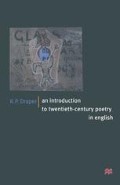Abstract
In a conference on the Literature of Region and Nation, held at Aberdeen in 1986, Seamus Heaney was able to say quite casually that ‘we are all regionalists now’. His point is that in the latter part of the twentieth century there has been a decline (and, by and large, he regards it as a welcome decline) in the feeling that English literature has its centre in London and the south-east of England. Regionalism as a literary phenomenon in England began in the late eighteenth century in the work of Wordsworth, Crabbe and Clare, and it grew to great strength in the nineteenth century with the novels of the Brontë sisters and Thomas Hardy. But this was the regional mainly in tension with the metropolitan. Though Hardy wrote approvingly that ‘A certain provincialism of feeling is invaluable. It is of the essence of individuality, and is largely made up of that crude enthusiasm without which no great thoughts are thought, no great deeds done,’ it was in refutation of Matthew Arnold who maintained that the provincial spirit lacked ‘the lucidity of a large and centrally placed intelligence … it has not urbanity, the tone of the city, of the centre’.1 It was Hardy’s Jude the Obscure against Arnold’s dreaming spires of Oxford. In the twentieth century, however, social, political and economic forces all conspired to make the ‘centre’ less self-confident. If London remained at the heart of publishing and reviewing, places like Liverpool, Manchester, Newcastle and Hull became much more the regional capitals of a still urban, but no longer London-based literary activity. Many of the best English poets came from the regions and maintained a non-metropolitan, or even anti-metropolitan, outlook, as do poets like Ted Hughes and Simon Armitage (b. 1963) today.
Preview
Unable to display preview. Download preview PDF.
Notes
Thomas Hardy in The Life of Thomas Hardy, and Matthew Arnold in ‘The Literary Influence of Academies’. See Robin Gilmour, ‘Regional and Provincial in Victorian Literature’, in R. P. Draper (ed.), The Literature of Region and Nation (London and Basingstoke: Macmillan, 1989) pp. 51–60.
See the essays on MacDiarmid in Iain Crichton Smith, Towards the Human (Edinburgh: Macdonald, 1986)
Seamus Heaney, Preoccupations: Selected Prose, 1968–1978 (London: Faber and Faber, 1980; reprinted 1984) p. 197.
Edwin Muir Scott and Scotland (1936). Quoted by Douglas Dunn in his Introduction to The Faber Book of Twentieth Century Scottish Poetry (London: Faber and Faber 1992) p. xxxiii
In Henry Treece, Dylan Thomas: Dog Among the Fairies, quoted by R. B. Kershaw, Dylan Thomas: The Poet and His Critics (Chicago: American Library Association, 1976) p. 194.
Viktor Shklovsky, ‘Art as Technique’, quoted by Raman Seiden, A Reader’s Guide to Contemporary Literary Theory (Brighton: Harvester, 1985) p. 10.
Bernard O’Donoghue, Seamus Heaney and the Language of Poetry (Hemel Hempstead, Herts: Harvester Wheatsheaf, 1994).
O’Donoghue, op. cit., p. 145. O’ Donoghue is here paraphrasing what Heaney writes in his critical work The Government of the Tongue (London: Faber and Faber, 1988)
Copyright information
© 1999 R. P. Draper
About this chapter
Cite this chapter
Draper, R.P. (1999). Regional, National and Post-Colonial (I). In: An Introduction to Twentieth-Century Poetry in English. Palgrave, London. https://doi.org/10.1007/978-1-349-27433-8_9
Download citation
DOI: https://doi.org/10.1007/978-1-349-27433-8_9
Publisher Name: Palgrave, London
Print ISBN: 978-0-333-60670-4
Online ISBN: 978-1-349-27433-8
eBook Packages: Palgrave Literature & Performing Arts CollectionLiterature, Cultural and Media Studies (R0)

